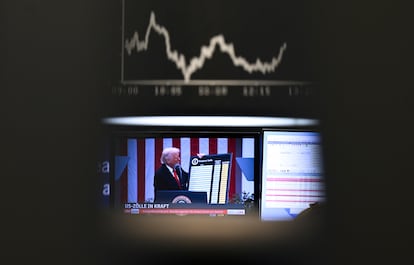The honeymoon is over for Donald Trump
Inertia is not enough to counter the US president; he must be confronted before he causes further destruction

There are moments in history when reality forks and doubles or triples, as if it were playing out in parallel on several screens. In recent days, reality in the United States has had this multiple quality. And one of the characteristics of such moments is that it is difficult to predict which of these realities will ultimately prevail over the others in the long term.
Let’s look at the facts. A few days ago, Donald Trump launched his global tariff war, which he bombastically dubbed “Liberation Day.” Less than 24 hours passed before the world’s stock markets plummeted. In the days that followed, many governments, investors and major corporations vented their anger, predicting the end of the global order and a commercial throwback to the 19th century, before the first globalization.
Weeks earlier, the same president had dusted off the Alien Enemies Act of 1798 to declare the Venezuelan gang Tren de Aragua a terrorist organization and deport its alleged members to Cecot, a maximum-security prison in El Salvador. Many have linked the antiquated law to the era of forced Japanese detentions during World War II, even though there is no declared war, as there was then, and the gang’s threat to national security is mere political propaganda. This time, the reaction came from a lower court, where a federal judge ordered a halt to the deportation flights. The Supreme Court responded that Trump could resume the deportations, but with a procedural ruling that leaves open the possibility of further challenges.
These responses portend that Trump’s quarrelsome, capricious, and violent use of presidential power in areas as diverse as immigration, justice, and the economy could usher in an era of upheaval and turmoil within and outside the United States.
There is already concrete evidence of widespread discontent with key policies of his administration. The Pew Research Center published a survey this week revealing that a majority of Americans think the tariff slam, particularly against China, will be negative for the country and their own pockets. They also have a critical view of key points of foreign policy. They believe Trump has favored Russia and Putin too much in the war with Ukraine, just as he has favored Israel in its scorched-earth campaign against Palestine. Regarding the announced imperial plans for territorial expansion, 54% oppose the seizure of Greenland and 62% oppose the seizure of Gaza.
Another survey revealed that consumer and small business confidence in the economy has been falling precipitously since a peak of optimism on the day of Trump’s inauguration on January 20. The honeymoon with his administration is over. Tariffs have been the main factor. The nuclear tariff war, as Bill Ackman, a major Trump financier, defined it, “is destroying confidence in our country as a trading partner, as a place to do business, and as a market to invest capital,” he tweeted. That’s true, but their effect is unpredictable: tariffs could become the lid on a global Pandora’s box. In a last-minute maneuver, Trump caved to the globalist camp in his circle, represented by Ackman and Elon Musk, declaring a 90-day pause in the nuclear trade war, which caused the New York Stock Exchange to rise nearly 10%. To protect itself from global ridicule, the U.S. exemplarily punished China with a 125% tariff on its exports to the United States.
The irresponsible tariff move has exposed Trump’s delirium of power like no other. However, it is just one of the many factors fueling public discontent.
And that discontent has begun to be heard loud and clear in many quarters, including within the presidential circle. In the media, the headline news these days has been the stock market roller coaster, but if we look closely at the screens showing the streets, the most important thing has been the 1,200 protests of the nascent Hands Off movement, which took place last Saturday across the country.
In Boston, I went to gauge the mood of the protest. Thousands of citizens gathered in front of the government building to vent their anger on imaginative and biting signs criticizing Trump and his deputy Musk. One of those signs perfectly summed up the sentiment among the crowd: “Get your tiny hands off Social Security, veteran benefits, kids lunches, private data, libraries, science, LGBTQ+ rights, freedom of speech, immigrants, jobs, our wallets, our bodies, the Centers for Disease Control, other countries, free markets...”

Although it was a progressive protest, scenes like the one I saw were repeated in cities large and small, blue and red. What was remarkable about the public response was its diverse composition and festive mood: a celebration of people up in arms and with a sense of radical opposition to the Trump administration.
It’s incredible that a protest of this magnitude occurred outside the Democratic Party, the main political organization opposed to the government. Since Trump’s inauguration on January 20, many have wondered where the Democratic leaders are and have angrily demanded a strategy to confront Trump’s onslaught against government institutions. Amid public expectation, Senator Bernie Sanders (a former Democrat, now an independent) and Democratic Congresswoman Alexandria Ocasio-Cortez went on tour to denounce the dismantling of the U.S. welfare state at the hands of an all-powerful oligarchy. They were joined by Senator Cory Booker with a marathon diatribe in Congress — more than 25 hours long — against Trump’s policies, in which he called on Democrats to assume their responsibility to the population. Former president Barack Obama and former vice president Kamala Harris followed suit. Finally, the Democratic National Committee announced the launch of a war room to confront the Trump administration, encompassing “communications, research, and mobilization” operations.
Until now, the Democratic response has been inaction: letting Trump himself collapse his government by destroying his political base while they wait for the midterm elections, when the Democrats could recapture the Senate and the House. It’s now clear that inertia isn’t enough to counter Trump. He must be confronted before he causes further destruction.
Trump’s retreat from the nuclear tariff war reveals that neither other countries nor his oligarchic acolytes are kissing his ass as he would like, that he has not been able to create a reality tailored to his desires, and that, despite being the most powerful man on earth, he is still susceptible to being influenced by the forces he himself has set in motion. For a moment, it seems as if rationality has prevailed over the chaotic realities we see on the split screens. But it is only a deceptive respite. As long as a narcissistic egomaniac is at the helm of the United States, we will continue to live dizzying days, and reality will continue to flux as erratically and unpredictably as Trump himself. The good news is that hundreds of thousands of citizens deeply concerned about the direction of their country have already sent a clear signal in the streets. Now, Democratic political leaders, along with Republicans who want to assume their responsibility to the nation, must take note and limit Trump’s power.
Sign up for our weekly newsletter to get more English-language news coverage from EL PAÍS USA Edition
Tu suscripción se está usando en otro dispositivo
¿Quieres añadir otro usuario a tu suscripción?
Si continúas leyendo en este dispositivo, no se podrá leer en el otro.
FlechaTu suscripción se está usando en otro dispositivo y solo puedes acceder a EL PAÍS desde un dispositivo a la vez.
Si quieres compartir tu cuenta, cambia tu suscripción a la modalidad Premium, así podrás añadir otro usuario. Cada uno accederá con su propia cuenta de email, lo que os permitirá personalizar vuestra experiencia en EL PAÍS.
¿Tienes una suscripción de empresa? Accede aquí para contratar más cuentas.
En el caso de no saber quién está usando tu cuenta, te recomendamos cambiar tu contraseña aquí.
Si decides continuar compartiendo tu cuenta, este mensaje se mostrará en tu dispositivo y en el de la otra persona que está usando tu cuenta de forma indefinida, afectando a tu experiencia de lectura. Puedes consultar aquí los términos y condiciones de la suscripción digital.








































